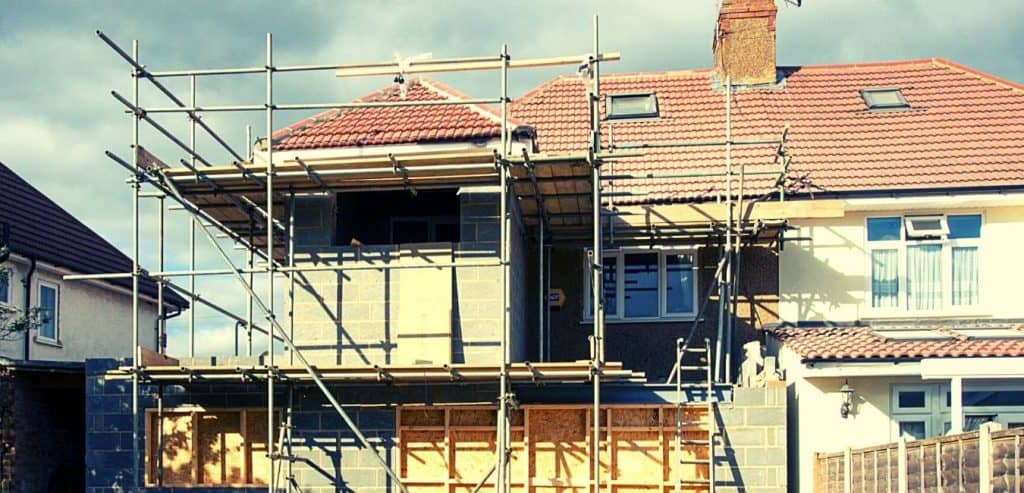Comparing the two, it may seem cheaper to build your house since the average cost is as low as $100,000 depending on your needs, while the average cost of purchasing a single-family home is around $300,000.
However, before building a house, you should go through all the factors that may affect your final costs. These are; materials needed, labor, location per state, size, and scope of work.
In this article, we will discuss the average cost of building a house in 2023.
Table of Contents
The average costs to build a house
The average cost of building a home ranges between $100 and $200 per square foot, with the median price at around $150.
In high-end areas, the costs can skyrocket to over $350 per square foot.
Average cost by square foot
We’ve summarised the average amount you’d expect to spend by the property’s square footage.
| Square Feet | Average Construction Cost |
| 600 | $60000-$120000 |
| 800 | $80000-$160000 |
| 900 | $90000-$180000 |
| 1000 | $100000-$200000 |
| 1200 | $120000-$240000 |
| 1500 | $150000-$300000 |
| 1600 | $160000-$320000 |
| 1800 | $180000-$360000 |
| 2000 | $200000-$400000 |
| 2500 | $250000-$500000 |
| 2700 | $270000-$540000 |
| 3000 | $300000-$600000 |
| 4000 | $400000-$800000 |
| 5000 | $500000-$1000000 |
Average New House Cost Per Square Foot
The highest cost to build a house is $500 while the lowest is $100 per sq ft. The average American family of four can comfortably fit in a house of about 2,000 square feet. Prefabricated houses are cheaper to build than custom-made houses that need more raw materials and resources.
Price to Build a House by state
The cost to build a house depends mostly on its location.
Below are the average costs to build a 2,000-square-foot house in each state.
| STATE | STATE AMOUNT |
| Illinois | $265,440 |
| Kansas | $225,000 |
| Missouri | $226,760 |
| Mississippi | $255,320 |
| Minnesota | $236,980 |
| Michigan | $216,780 |
| Massachusetts | $350,820 |
| Maryland | $294,160 |
| Maine | $282,140 |
| Louisiana | $269,920 |
| Kentucky | $280,580 |
| Kansas | $207,120 |
| Iowa | $214,040 |
| Indiana | $219,300 |
| Alabama | $267,620 |
| Idaho | $315,520 |
| Pennsylvania | $302,200 |
| Wyoming | $290,420 |
| Wisconsin | $239,140 |
| West Virginia | $301,120 |
| Washington | $343,100 |
| Virginia | $310,100 |
| Vermont | $307,840 |
| Utah | $288,560 |
| Texas | $264,100 |
| Tennessee | $261,940 |
| South Dakota | $204,420 |
| South Carolina | $301,840 |
| Rhode Island | $338,180 |
| Montana | $298,960 |
| Oregon | $340,580 |
| Oklahoma | $260,500 |
| Ohio | $222,480 |
| North Dakota | $212,500 |
| North Carolina | $301,500 |
| New York | $360,180 |
| New Mexico | $290,940 |
| New Jersey | $376,900 |
| Arkansas | $251,800 |
| New Hampshire | $299,900 |
| Nevada | $334,140 |
| Nebraska | $210,900 |

Building Cost Estimator
Labor and material costs make up the bulk of home building expenses, and these depend heavily on supply and demand in your area. Always compare quotes from local construction professionals.
TYPE OF EXPENSE AMOUNT
- Off-site living accommodations (7 months) $8,600 – 11,900
- Water and sewer inspections $4,500
- House plans $500 – $3,500
- Construction project management fees $3,000 – $52,000
- Building permits $3,000
- Impact fee or local charges $3,000
- Excavation $2,300
- Foundation $8,000
- Framing $33,000
- Exterior Siding $11,500
- Roofing $9,200
- Exterior windows and doors $7,750
- HVAC $11,200
- Plumbing $11,000
- Electrical $10,100
- Insulation $5,000
- Drywall $15,550
- Painting $7,000
- Trim and interior doors $11,000
- Flooring $10,250
- Cabinets and countertops $11,800
- Plumbing fixtures $3,200
- Lighting fixtures $3,700
- Appliances $3,000
- Driveway $4,500
- Landscaping $5,860
- Cleanup $2,300
- Contingencies/other $45,000
Preconstruction costs
Dreaming of your new home is an exciting time. While planning your budget, it’s important to consider concurrent costs, such as living expenses during construction. Financing your new build means securing affordable housing until you can safely move in.
A new home construction can take anywhere from seven to 24 months. The total timeline depends on the availability of materials and builders in your area as well as the accessibility of the site.
Plot of Land Costs
Purchasing the plot of land that you’ll build on is the first expense you’ll encounter. However, land value is not included in our $300,000 average because prices vary widely based on innumerable factors ranging from soil quality to the view from your new front porch. Check plot prices in your desired location.
Water and Sewage Inspection
After you’ve purchased land, you’ll need to inspect the property for water and sewage to ensure that the house can have the proper water supply and waste drainage systems. This is especially important for new builds and waterfront sites. This assessment typically costs about $4,500 but may be cheaper if there are existing lines.
Demolition and Deconstruction
If you’ve purchased a site with an unsalvageable or undesired house, add the cost of demolition to your budget. This can range from $6,000 to $20,000. To save and sell features of the old building, deconstruction can cost $24,000 or more.
House Plans or Architectural Fees
Then, you’ll need to buy or create house plans. You can purchase pre-designed blueprints online for a minimum fee. If you’d like a custom home, budget to pay an architect or draftsperson to design your dream floor plan. Architect fees for residential projects may range from 8 to 12% of the construction cost.
Construction Management Fees
Your architect may recommend a construction management firm to oversee your project. It’s generally a good idea to hire an experienced project manager to help with:
- Coordinating laborers
- Organizing material deliveries
- Managing workmanship quality
- Completing necessary paperwork
Their fees can range from 5 to 15% of the total construction. Working with an experienced manager you can trust will save everyone time and headaches.
Building Permits and Local Fees
Once you have plans in hand, expect to pay building permits, impact fees, and all state or municipal fees before construction can begin.
House Exterior Costs
Excavation
When it’s finally time to break ground on your new home, the first expense is excavation. Costs can range from about $1,400 to $3,200, and it prepares the site for a sturdy foundation.
Foundation
The foundation is one of the most critical parts of your home and a large portion of any construction budget. Expect to spend between $4,500 and $10,500 for a typical slab foundation.
A foundation with a basement ranges from $18,000 to $80,000. The high end of this range means more livable space and a finished basement.
Framing
Your new home begins to take shape during the framing stage of construction. Framing is the highest material cost for most new home builds. High-quantity lumber framing averages $33,000 for a home in the U.S. This includes floors, walls, and roof trusses. Metal stud framing systems start at about $20,000.
Roofing
Most home builders install affordable asphalt shingles. Shingle roofing costs between $5,500 and $11,500. The cost of your new roof depends mostly on which type of roof you choose.
Siding
Like roofing, high-quality weatherproof wrapping and exterior siding is an investment in the durability of your home. Siding costs an average of $12 per square foot. You can choose from several types of siding, such as affordable vinyl or high-end natural stone.
Driveway
A paved driveway costs roughly $4,500, while a gravel driveway averages much less, at around $1,500.
Landscaping
Taking your home from the construction zone to a beautiful finished product requires a landscaping budget. Expect to spend something like $2,000 to install sod grass and other plants.
You can spend as much or as little money as you want on the garden, but remember that the home’s curb appeal may matter down the line. Planting flowering or fruit trees means enjoying their fragrance and produce for years.

Home Interior Costs
Plumbing
The type of plumbing material used will affect the final costs. The most expensive plumbing, usually with copper pipes, cost about $12,000 for a 2,000-square-foot house.
Cheaper alternatives to copper pipes are cross-linked polyethylene and polyvinyl chloride (PVC).
Electrical
All electrical installations should be handled by a certified electrician who will charge you around $4 per square foot to install electrical wiring.
The cost varies based on your floor plan’s complexity, the type of electrical panels, the wiring material used, and the number of switches and outlets.
HVAC
The cost of installing HVAC (heating, ventilation, and air conditioning system) is between $5,000 to $12,500. This includes the installation of ductwork, central AC, and a furnace. It will cost you an additional $4,500 if you add warmth to your house with a masonry fireplace.
Insulation
Insulation helps to keep your house temperatures comfortable. The materials and labor needed to insulate your house will cost roughly $3,000 to $5,000.
Drywall
Your house will start coming to life when the walls are covered with drywall. Installing drywall costs between $1.50 and $3 per square foot of your walls.
Doors and Windows
Most homeowners pay between $6,000 and $8,500 to install new doors and windows for a new construction project. How much you pay depends a lot on the style of door and types of windows you choose.
Interior doors average around $250 per door, including the unit and labor. Bi-fold doors cost less, while pocket doors cost more. Depending on size and style, exterior doors range from $400 to $3,500.
Typical, double-hung vinyl windows cost about $175 per window. Complex window structures, like bay windows or dormers, cost significantly more but add dimension and curb appeal to your home.
Professionally painting your home costs about $5 per square foot, depending on local labor. You can save on labor by DIYing this task. Before you start, learn more about the different types of paint on the market, and use a face mask.
Cabinets and Countertops
For all cabinet installation costs, use local carpentry rates that can cost approximately $6,550.
Among the most affordable countertops, Laminite countertops average $2,450. Laminate is among the most affordable. Stone like quartz, granite or marble can cost as much as $100 per square foot. Budget for your preferred type of backsplash as well.
Trim
The quality of work and cost of trimming a house varies between finishing carpenters. Trimming a house will cost you about $1,500
Flooring
Flooring usually costs between $1,500 and $4,500 depending on the preferred style of flooring, style, and your budget.
Fixtures
Plumbing features like toilets, sinks, showers and tubs are around $5,000. Additional fixtures like fancy spas will increase the final costs. Depending on the type you choose, lighting fixtures can cost you between $35,00 to $12,000.
Appliances
Your house will need different appliances installed to start to feel like a home. Washers and dryers may cost around $1,500, while kitchen appliances can cost you $4,000. The total cost of appliances ranges between $8 and $30.
Furniture
Furnishing is an essential final process of building that transforms a house into a home. Your choice of furniture depends on your preferred style, house theme, and the accessibility of the furniture you like.
Furnishing a 2,000-square-foot home is between $30,000 to $80,000.
Additional Features
Your cost of construction will increase if you add luxurious features to your home. For example, building an indoor pool can cost you an additional $28,000, while building your porch will cost approximately $20,000.
Labor
Labor costs take up around 30 to 50% of the entire construction project. Labor costs differ from one state to another. For example, labor costs will be higher in populated urban areas like New York than in rural areas like Oklahoma. Below is a breakdown of labor costs varying from one worker to another.
General contractors take up 10% to 20% of the entire project cost, while construction managers take between 5% to 15%. Electricians are paid $50- $100 per hour while house farmers are paid $7 per hour. Architectural pay is between $100-$250 per hour, and a landscape architect is paid $50 to $500.
Interior designers are paid between $50-$500, while draftsperson designer rates range from $8 to $ 150 per hour.

Frequently asked questions
Can you get a loan to build a house?
Yes! Of course, you can get a loan to build a house. Unless you are paying cash, you will need a loan to finance your building. House building loans come in two types. Some lenders offer a one-step loan that accrues interest during construction and turns to a mortgage during completion. Other lenders provide an interest-only type of loan on the project, usually at a prime fee.
What is the cheapest type of house to build?
The cheapest house to build is a prefabricated container. It is small, but it falls within a minimal budget of as low as $15,000. If you want something simple with minimal features, you can build a prefabricated house. A 3 bedroom prefabricated house costs are as low as $50,000.
Is now a good time to build a house?
Right now is a difficult time to buy a house as there is limited housing stock. According to Redfin real estate company, the overall house supply is down 22%. That means if you want to change, you will have to build a home. Builders are in construction mode, building many houses to cover the demand, making it the perfect time to build a house.
Is it cheaper to buy or build a house?
The answer here varies on circumstances. At the outset and sticker price alone, buying a house is cheaper than building. Buying a house means one can move in quickly. Building a home, however, gives one the freedom to customize. You do not need old features that a former homeowner wanted. You also won’t have renovation and retrofitting costs. All the money you invest will go into something new. A new house is cheaper to maintain, more efficient with its appliances and has a higher resale value.
Conclusion
Choosing to build your home requires time, resources, and a lot of research. With proper planning, homeowners can build their most preferred homes. Ensure that you pick the most suitable construction plan to your needs and budget.

